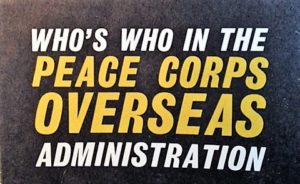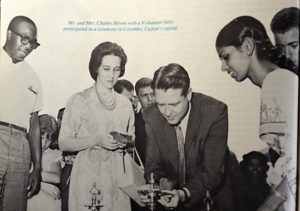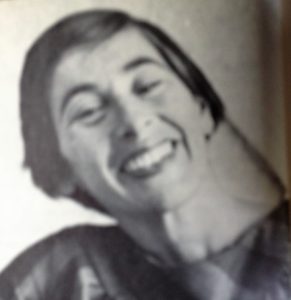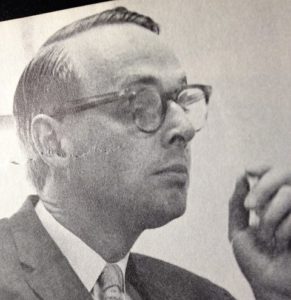Ceylon’s First Peace Corps Staff
 Timmy Napolitano came to the Peace Corps in March, 1961, “on loan” from the National Institutes of Health. For her, the move was permanent—or as permanent as anything in the Peace Corps—although she remained “on loan” for two months after responding to directions to “come now. We’ll arrange your papers later.”
Timmy Napolitano came to the Peace Corps in March, 1961, “on loan” from the National Institutes of Health. For her, the move was permanent—or as permanent as anything in the Peace Corps—although she remained “on loan” for two months after responding to directions to “come now. We’ll arrange your papers later.”
If the Peace Corps is not as hectic now as it was then, a certain hectic quality has continued to linger around Mrs. Napolitano’s career. After helping to organize the Near East-South Asia Regional Office, she settled down to pay particular attention to South Asia when queries about the Peace Corps came from Ceylon.
In answer to these queries, Mrs. Napolitano was dispatched on October 9, 1961, to the five-year-old island nation off the southern tip of India. In a stay of four months, she surveyed the island from Jaffna to Matara and from wet western coast to the arid east. The result of her visit was the Ceylon program—to consist of home economics and physical education teachers and science and mathematics teachers, some to be trained in Sinhalese, the others in Tamil. Mrs. Napolitano returned to Washington. Two months later, she returned to South Asia as Acting Representative for India.
On July 7, 1962, five weeks after the Volunteers had entered training Oliver Popenoe was sent on temporary duty to Ceylon as Acting Representative. Later to be named Deputy Representative in Malaya, Popenoe, like Mrs. Napolitano, was close to being a charter member of the Peace Corps staff in the Near East-South Asia Regional Office.
In the two months before the scheduled September 6 arrival of the Peace Corps teachers, Popenoe checked out the 15 to 20 living sites where the 39 men and women would be assigned and completed all other preparations for their arrival.
When the Volunteers stepped off the plane in Colombo, they were accompanied by Deputy Representative Charles Moore. Moore took over as Acting Representative on September 7, two days before Popenoe left for Washington.
A native of Jonesboro, Ga., Moore joined the Army Air Force right after high school and went sent at the age of 18 –and in the midst of World War II—to India and Pakistan where he served as a cryptographer. Discharged a sergeant in June, 1946, he went back to Georgia and took a job with Ernest G. Beaudry, Inc., and auto dealer in Atlanta.
As a result of a decision to enter the ministry, he enrolled in Mercer University in Macon, Ga, where he obtained a degree in sociology in 1954. He went on to study at the Colgate-Rochester Divinity School in Rochester, N.Y.

Mrs. & Mr. Charles Moore with a Volunteer (left) participated in a ceremony in Colombo, Ceylon’s capital.
Moore then entered Harvard Divinity School where he obtained his S.T.B. degree in 1959 after serving as a student minister in the Northfield and Bernardston Unitarian churches. His first appointment as a full minister took him to the Unitarian church in Chattanooga. There he was active in the Chattanooga Literacy Movement, the American Association for the United Nations, and the Experiment in International Living.
In the midst of his activities, Moore applied for a position with the Peace Corps overseas staff. He successfully weathered the Talent Search interviews and was named Deputy Representative in Ceylon.
Before he joined the Volunteers in the long flight to Colombo, Moore had already joined them—part time—in their training program at the University of Pennsylvania. He also undertook the intensive orientation program at Peace Corps headquarters in Washington which is given to those overseas administrators without previous government experience.
The Talent Search—at that time–was designed to yield administrators with character and intelligence, personal qualities which are given preference over governmental expertise in an agency whose activities are without precedent. Like a number of Peace Corps administrators, Moore, as Acting Representative, studied his job on the job.


No comments yet.
Add your comment